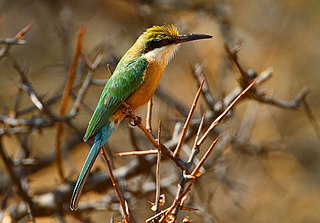
The superb starling is a member of the starling family of birds. It was formerly known as Spreo superbus.

The eastern (pale) chanting goshawk, or Somali chanting goshawk, is a bird of prey of East Africa.

The red-and-yellow barbet is a species of African barbet found in eastern Africa. Males have distinctive black, red, and yellow plumage; females and juveniles are similar, but less brightly colored. The species lives in broken terrain and nests and roosts in burrows. Omnivorous, the species feeds on seeds, fruit, and invertebrates. Where not hunted, they are tame, but their feathers are used by certain tribes, such as the Maasai.

The Somali bee-eater is a species of bird in the family Meropidae. It is found in Ethiopia, Kenya, Saudi Arabia, Somalia and Tanzania. This is a small bee-eater that prefers arid country and desert areas where it may be locally common. The International Union for Conservation of Nature has assessed its conservation status as being of "least concern", postulating that clearing of woodland and forest is creating new suitable habitat for the bird and that its population trend may therefore be rising.

The white-bellied bustard or white-bellied korhaan is an African species of bustard. It is widespread in sub-Saharan Africa in grassland and open woodland habitats.

The white-browed robin-chat, also known as Heuglin's robin, is a species of bird in the family Muscicapidae. Found in east, central and southern Africa, its natural habitats include riverine forest and thickets, and it is also found near humans. The IUCN classifies it as a least-concern species.

The bearded scrub robin, also known as the eastern bearded scrub robin, is a species of bird in the family Muscicapidae. It is found in eastern and southern Africa.

The bar-tailed trogon is a species of bird in the family Trogonidae. It is a resident bird to central Africa that eats primarily insects and fruits.

The black-fronted bushshrike is a passerine bird of the bushshrike family, Malaconotidae. It inhabits forests mainly in East Africa. It forms a superspecies with the many-colored bushshrike and the two are sometimes considered to be a single species.

Heuglin's wheatear is a small passerine bird in the wheatear genus Oenanthe.

The Tsavo sunbird is a small passerine bird of Kenya and Tanzania. It is sometimes lumped with the purple-banded sunbird.












